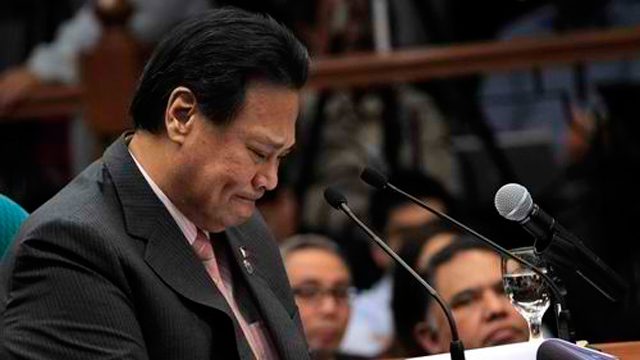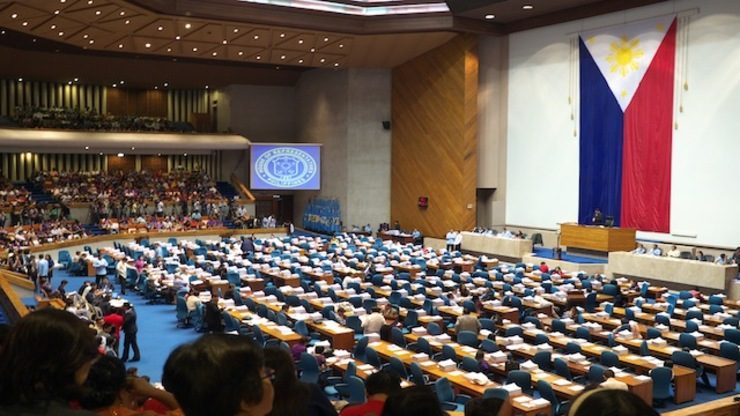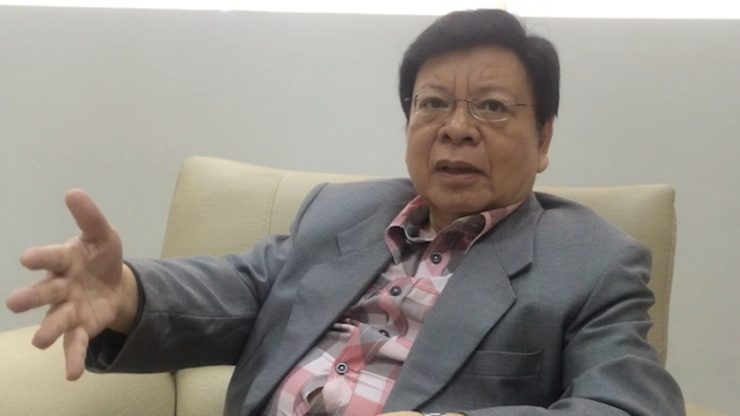SUMMARY
This is AI generated summarization, which may have errors. For context, always refer to the full article.

MANILA, Philippines – When the administration moved in December 2012 for the swift impeachment of Supreme Court Chief Justice Renato Corona, the House of Representatives leadership gathered administration allies to make its case. Former Alagad partylist Representative Rodante Marcoleta joined the emergency meeting to see how it would go.
A member of the homegrown church Iglesia ni Cristo (INC), Marcoleta’s votes in Congress always depended on the instructions of the Iglesia leadership. Unity is part of the Church doctrine, the former partylist representative explained. The partylist claims to represent poor Filipinos.
“They will tell me how I’m going to vote. My consultation with them has no bearing,” he said.
Before the emergency meeting inside Andaya Hall, Marcoleta had been instructed against joining efforts to remove Corona. “Ako ang nag-ano (tumawag). ‘Ano po ba ang position natin? Mas mabuti siguro kung huwag na tayo sumali sa impeachment,” Marcoleta recalled to Rappler his conversation with a Church leader. (I asked: What is our position? I was told it’s best if we do not participate in the impeachment.)
“The fundamental position of the Iglesia is to avoid instability. Although it is a political exercise, alam na magdudulot ng instability. Mas mabuti pasensiyahan na lang,” Marcoleta explained. (Although it is a political exercise, it was known to cause instability. Better to just bear with it.)
Iglesia also informed Speaker Feliciano Belmonte Jr of its position against Corona’s impeachment.
Like the Catholic Church, Iglesia ni Cristo is not beyond wielding its influence on politicians to get them to support the church’s position on issues. Its power lies in its ability to deliver bloc votes of 5-7 million, based on estimates. What kind of politician would not want to be in Iglesia’s graces?
There is a price to pay for the endorsed politicians. “Natural lamang na pagdating ng araw ay sisiyasatin siya. Congressman ka na ngayon, bakit ka naman sumusuporta sa mga bagay na laban sa paniniwala namin? If that influences him (politician), I could understand that,” said Marcoleta. (It’s natural that there will come a time he will be assessed. You’re a congressman now, why are you supportive of things that run counter to our belief?)
But President Benigno Aquino III wanted the impeachment of Corona and the House of Representatives delivered. Belmonte succeeded right there and then to get the support of the House majority bloc. Once the signing began, Marcoleta left the room.
“To the credit of the Speaker, he never pressured me to vote for the impeachment,” Marcoleta said.

When the complaint reached the Senate, Iglesia also “relayed” its position to the senator-judges. The final vote was 20-3 to convict Corona, the first time that a Philippine chief justice was removed from office. President Aquino also won in the Senate.
What did the church feel? “Wala namang tampuhan except masasabi mo na si ganito eh bolero pala,” Marcoleta said. Without going into details, Marcoleta said there were senators who committed to support the Iglesia position but did not deliver. (No hard feelings but we could tell who was not truthful.)
Iglesia doctrine is silent on the RH bill
In the same 15th Congress, proponents of the Reproductive Health law made a big deal about Iglesia’s “endorsement” of the measure. At a time when the Catholic bishops were giving lawmakers personal visits and were attacking pro-RH lawmakers in the pulpits, the support from Iglesia was more than welcome.
But the truth is Iglesia did not really actively lobby for the passage of the RH bill, said Marcoleta. “There is no active or even direct participation either in opposition or in support of the RH bill. The only reason the position was taken up by media was because the committee sought the opinion of the Church,” he said.
“The RH bill has no doctrinal value. It is not going against any of the doctrines of the Iglesia,” Marcoleta said. Unlike the Catholic Church, Iglesia upholds the use of artificial contraceptives.
The RH law would pass the legislative mill by a hairline victory of 9 votes, 113-104, in the most crucial second reading vote in the House of Representatives. (READ: RH law: The long and rough road)

But Iglesia’s position was hardly a factor in the success of the RH bill. It passed because the administration’s tactics prevailed over the Catholic Church’s. But in the fierce media battle between the critics and supporters of the measure, Iglesia’s position got some media mileage.
The 2013 midterm elections that followed the tumultuous 15th Congress showed the difference between the Catholic Church and INC. The Catholic Church, the religion of at least 80% of Filipinos, could not get its entire flock to vote for the “Team Buhay” who voted against the RH bill and junk “Team Patay” lawmakers who voted in favor of the measure. The so-called Catholic vote was debunked.
On the contrary, the smaller church of Iglesia ni Cristo made its strength felt when it junked Senator Francis Escudero. Without the Iglesia vote, the former Senate race frontrunner ranked 4th in the final tally. The top 3 candidates were backed by Iglesia.
“We can ask them not to support that. Pero hindi namin sila mapipilit. Nangyari na ito. Hindi naman lahat ng kinausap mo….Kapag sinabi niya ‘opo,’ nakikita namin hindi naman lahat eh. Okay lang we are in a democracy. Kaya lang kapag makikita si congressman or si senator ay hindi rin siya ano sa sinasabi niya, mamamarkahan ka rin siguro,” Marcoleta said.
(We can ask them not to support that. But we can’t force them. This happened in the past. Not everyone you talk to, even if they say yes, not everyone follows. It’s okay, we are in a democracy. But when we see this congressman or that senator not being true to what he says, chances are, he will get marked.)
Bloc voting among members of INC is possible because of its centralized structure akin to government. It has national, regional, and local organizations. The national leadership makes the decisions, which are cascaded by local leaders to members.
It is this bloc voting also that fanned perceptions of outsiders about Iglesia, raising questions about the supposed violation of the right of members to choose who they will vote for.
But Marcoleta said members do not care about the criticisms. “They do not understand the spirituality behind this. Akala nila sinasakal kami (They think we’re being stifled). It is not so. Before one becomes a member, he is immersed into a process called indoctrination. The extent of unity, including bloc voting, is explained….unity involves and encompasses everything. One has the option to not become a member.”

Divorce bill may show Iglesia’s full might
At the moment, Iglesia cannot claim credit for passing or for junking a law or a bill. Marcoleta said he cannot remember the church going all out for a particular measure. But he said it may be a different story if the proposed measure goes against Iglesia doctrine, however.
“One example is if they will pass a bill encouraging the consumption of food concoctions mixed with blood. That is forbidden. The church will issue a position on the bill as far as the Iglesia is concerned. We don’t support that because we are forbidden to consume blood. But they will not be confrontational,” said Marcoleta.
Another example Marcoleta raised is the divorce bill, which Belmonte previously announced would be given attention under his leadership. The bill is still pending in the committee, however.
“For example, the House of Representatives pushes for a divorce bill. It will really go against Iglesia doctrine, which is the sanctity of marriage as far as the Church is concerned. In this case, Iglesia might work harder to oppose it,” Marcoleta said.
Iglesia will also oppose any bill to revive the death penalty, he added. “Ang Diyos lang ang puwedeng kumuha sa buhay. Siya naman ang nagbigay,” said Marcoleta. (Only God can take away life. It is he, after all, who gave it.)
Corona’s impeachment and the RH bills already show how Iglesia will likely block these measures.
“We are not confrontational. Offices may be used in order to air opposition in a way that it is not confrontative. We won’t do what the priests do – marching in the streets, using the pulpits, and paying lawmakers a visit in the gallery,” Marcoleta said. – Rappler.com
Add a comment
How does this make you feel?
There are no comments yet. Add your comment to start the conversation.